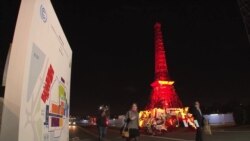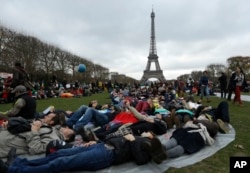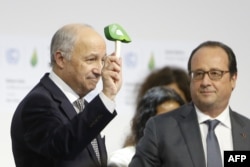Historic, but not historic enough, is the reaction from many activists and civil society groups to the climate deal reached in Paris late Saturday. But many others preferred to focus on the breadth and significance of the agreement.
Mohamed Adow of the anti-poverty group Christian Aid said, “For the first time in history, we have the whole world, rich and poor, making a public announcement to reduce their emissions and deal with the impact of climate change."
Thousands of climate activists on the streets of Paris Saturday were more outspoken about the climate agreement, which they said favors rich nations and does not hold accountable those responsible for polluting the Earth.
'Crimes' decried
About 6,500 people from different countries gathered beneath the Eiffel Tower, 10 kilometers from the conference site at Le Bourget, a northeastern district of Paris. They called for actions that contribute to global warming to be considered "crimes against humanity."
The accord makes key commitments on limiting global warming, although developing countries said they should be given more financial support for their efforts to meet those commitments.
French Foreign Minister Laurent Fabius presented the final draft of the global climate accord, with its long-term goal of eliminating net man-made greenhouse gas emissions this century. It also creates a system to encourage nations to make voluntary efforts to curb emissions domestically and promises billions of dollars to help poor nations cope with the transition to a greener economy.
The document says the planet's warming should be limited to “well below 2 degrees Celsius above pre-industrial levels,” and that nations should try to limit warming to 1.5 degrees.
But the reality of global climate trends appears to show that neither of those temperature goals will be met. National plans submitted ahead of the Paris conference indicate the Earth's average temperature by the end of this century will be close to 2.7 degrees above pre-industrial levels.
Environmental groups say the current warming trend could cause key ecosystems to collapse. Leaders of low-lying island nations say any temperature increase above 1.5 degrees threatens their very survival, as melting polar ice raises sea levels worldwide.
Countries will come back to the table every five years to review progress and set new commitments. The document calls for offsetting greenhouse gas emissions by other other environmental action, strong enough to remove that threat from the atmosphere after 2050.
“The new goal of net-zero emissions by the second half of the century will send consternation through the boardrooms of coal companies and the palaces of oil-exporting states,” said Kumi Naidoo, head of environmental group Greenpeace International.
Moral victory?
But the aid group Oxfam's chief of climate policy, Tim Gore, said the climate conference's commitment to temperature level might be little more than a moral victory. "It may ring hollow unless we see a significant increase in action in the years ahead,” he said.
The agreement sets a floor of $100 billion per year for developed countries to contribute to developing countries’ efforts to adapt to and mitigate climate change.
“That does not represent any progress from where we were” after the last major climate change meeting in Copenhagen, said Lidy Nacpil, coordinator of the Asian Peoples Movement on Debt and Development.
A mechanism to deal with loss and damage from storms, droughts, rising seas and other climate change impacts is contained in the document. But several groups chafed at the inclusion — reportedly at the insistence of the United States — of language that excludes the possibility of assigning liability or compensation.
“This deal has clearly shown that developed countries have erased their responsibility toward developing countries,” said Azeb Girmai, climate lead for LDC Watch International.
Some observers say the most significant outcomes of the Paris climate summit are outside the document itself. They point to the momentum generated behind actions to tackle climate change in cities and businesses.
“Businesses understand that something is in the offing,” said Philippe Defosses, director of the French pension fund ERAPF and a member of the We Mean Business industry coalition. “You have to be blind not to see it.”
In Washington, the environmental group Friends of the Earth and other local climate activists rallied in front of the White House to demonstrate their disappointment with what they said has been President Barack Obama’s failure to provide global leadership on climate issues. They contend the U.S., as the world's worst polluter in modern history, had the possibility of taking an equally historic position and leading the world community to a climate agreement based on scientific criteria and principles of justice.
VOA's Isabela Cocoli in Washington and Lisa Bryant in Paris contributed to this report.












